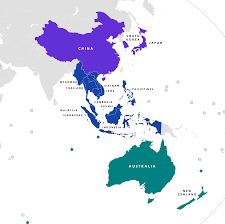Shifting Imperialist Alliances in Asia Increase Threat of World War

New Connections Among Workers Create Opportunities for Communist Growth
On November 15, China and 14 other countries signed the world’s largest trade deal apart from the World Trade Organization. The new Regional Comprehensive Economic Partnership (RCEP) forms a free trade zone in the Asia-Pacific region. It encompasses a third of the world’s economy, where 2.2 billion people live.
The pact will increase exploitation of workers throughout Asia as competition increases to produce more for lower wages. It doesn’t even give lip-service to improving labor conditions.
But it will connect workers throughout Asia, workers who can act together against growing attacks. It can open doors to the growth of a powerful communist movement.
The RCEP is the product of eight years of negotiations. It’s the first-ever trade agreement that includes China, Japan and South Korea. It could herald the start of a post-COVID-19 regional supply chain.
Importantly, the pact leaves out India and the US. India chose to drop out of the negotiations. Indian capitalists see China’s exports to India as a threat to their profits. They are betting on an alliance with the US.
RCEP could shift the center of world trade to Asia. The Chinese Minister of Trade predicted optimistically that “In the next five to ten years, the Asia-Pacific region will become the engine of the world’s economic development in terms of both production and consumption.”
This agreement, not yet formally ratified, represents a direct challenge to US imperialism. It renders hollow Biden’s promise to make the US central again to global economic and political development. By sharpening the rivalry between the largest imperialists, it brings world war closer.
We must take this opportunity to show workers everywhere that we have the same interest. We all need to get rid of capitalist wage slavery, competition, and wars for world domination.
Communist revolution will put an end to capitalism. Communist workers’ power will replace crises and sharpening exploitation with a communist world. The masses, organized in communist collectives, will produce to meet everyone’s needs, not for profit.
Communism will build ties based on relationships of respect, nurturing and collectivity, not deadly competition for jobs, money or maximum profit.
Contradictions within RCEP
Two days after fifteen nations signed RCEP, China’s Global Times warned two signatories, Japan and Australia, to back off their recent defense pact (the Reciprocal Access Agreement).
This pact was to be a step to an “Asian NATO,” a vision the US has long pushed. The Global Times called it “a new lever for the US to divide Asia” which will force China to seek deeper military cooperation with other Asian countries.
Trump withdrew from the Trans-Pacific Partnership a US sponsored anti-China trade pact, in 2017. This opened a void that RCEP fills.
Japan and Australia hope the US will rejoin and re-invigorate TPP. But for now, the US is reeling with Covid while China, South Korea and Japan are beginning to emerge from the pandemic and moving forward with their imperialist plans.
Richard Haas, head of the influential Council on Foreign Relations, warned that blaming Trump for “all or even most of the international challenges that will await Biden would be to misread history. Many were in play long before Trump and will persist long after he exits the Oval Office: a rising and more assertive China, a Russia willing to use military force and cyber-capabilities to advance its goals.”
Chinese capitalism-imperialism is clearly on the offensive. US capitalism-imperialism is on the defensive. The US imperialists will continue to fight to defend their rapidly declining empire.
But as contradictions among the imperialists are sharpening, so are those between the workers and the capitalists. Every capitalist fights for market share by attacking workers’ wages and living conditions harder. Workers are already fighting back.
Our fight-back, in Asia and everywhere, must aim to get rid of capitalism’s exploitation and wars by winning and building a communist world that meets our needs. ICWP collectives and networks need to spread Red Flag, especially among soldiers and workers. Please help translate Red Flag into many more languages!


